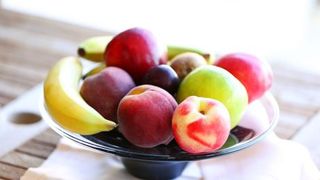Follow These Diet Tips To Lose Weight And Get Healthier
Rather than suffering through an unsustainable crash diet, use these seven easy tips to improve your day-to-day diet

Making wholesale changes to your diet overnight in an effort to eat more healthily is very rarely the right way to go. Such dramatic shifts are almost impossible to maintain, and generally no fun at all to try to stick to.
A better strategy is to make a few small healthy changes that improve your diet, changes that feel achievable but still yield tangible rewards in terms of better health. To help you out, here’s seven such changes from registered dietitian Helen Bond and Dr Sarah Jarvis, both of whom are consultants to cooking spray Frylight.
1. Reorganise your kitchen
“Spring clean your kitchen,” says Bond. “We’re far more likely to eat the foods we see first, so it’s important that your home is set up to support your healthy eating goals. Keep the foods you want to eat more of visible – fruit bowl on the kitchen table, vegetable sticks and cherry tomatoes in the fridge at eye level. And hide away on top shelves the foods that will tempt you but only add extra sugar and calories, and no extra nutrients, to your diet.”
2. Swap to diet drinks (or water)
“Despite all the scare stories about artificial sweeteners, the evidence is that they’re safe in the quantities most of us take them in, and you can reduce your calorie intake significantly by switching from sugary drinks to low-calorie ones,” says Jarvis. “Of course, water is even better!”
3. Try a cooking spray
“Spray rather than pour,” says Bond. “Liberally drizzling oil in the frying pan or adding knobs of butter can make food heavy with unnecessary fat, saturated fat and calories – not good news for your waistline or your heart health. Use a cooking oil spray, like Frylight. Five sprays of Frylight rapeseed oil is enough to coat a regular frying pan and contains just five calories and 0.6g fat, compared with 135 calories and 15g fat per 15ml tablespoon of rapeseed oil.”
4. Brown is better than white
“We hear a lot about the evils of carbohydrates, but in fact for most people unrefined – wholemeal or wholegrain – carbohydrates are an important part of a healthy balanced diet,” says Jarvis. “Go for wholegrain bread and pasta, and substitute brown rice for white.”
5. Switch to smaller plates
“If you want to lose a little weight and look after your health, it’s important to get to grips with portion sizes,” says Bond. “These have gone up and up over the years, and so have our crockery sizes. The bigger your plates, bowls and glasses, the more you’ll fill them; research shows that downsizing from a 12in to 10in plate could help you eat roughly 22% fewer calories, and you won’t feel like you’re missing out because you’re getting a plateful!”
Get the Coach Newsletter
Sign up for workout ideas, training advice, reviews of the latest gear and more.
See related
- 13 Expert Weight-Loss Tips
- What Is Cholesterol? Plus, How To Reduce Cholesterol Naturally
- How To Lose Belly Fat Fast
6. Don’t skip meals
“Avoid missing meals,” says Bond. “Quite simply, skipping meals is bad news for your health and waistline. It’s harder to get all the nutrients you need; low blood sugar levels can leave you feeling tired, irritable and unable to concentrate; and extreme hunger may cause you to overeat at your next meal as well as not making the healthiest food choices.”
7. Cut down on saturated fat
“Saturated fat, found in full-fat meat and dairy products, is high in calories and can increase levels of LDL or ‘bad’ cholesterol in your blood, increasing your risk of heart attack and stroke,” says Jarvis. “To cut down on saturated fat use lean cuts of meat, and ideally have at least a couple of meat-free days a week. Grill rather than fry, use a low-fat spray rather than adding butter or oil to your pan, and when you do have fat, opt for unsaturated options such as avocados and oily fish.”

Nick Harris-Fry is a journalist who has been covering health and fitness since 2015. Nick is an avid runner, covering 70-110km a week, which gives him ample opportunity to test a wide range of running shoes and running gear. He is also the chief tester for fitness trackers and running watches, treadmills and exercise bikes, and workout headphones.
